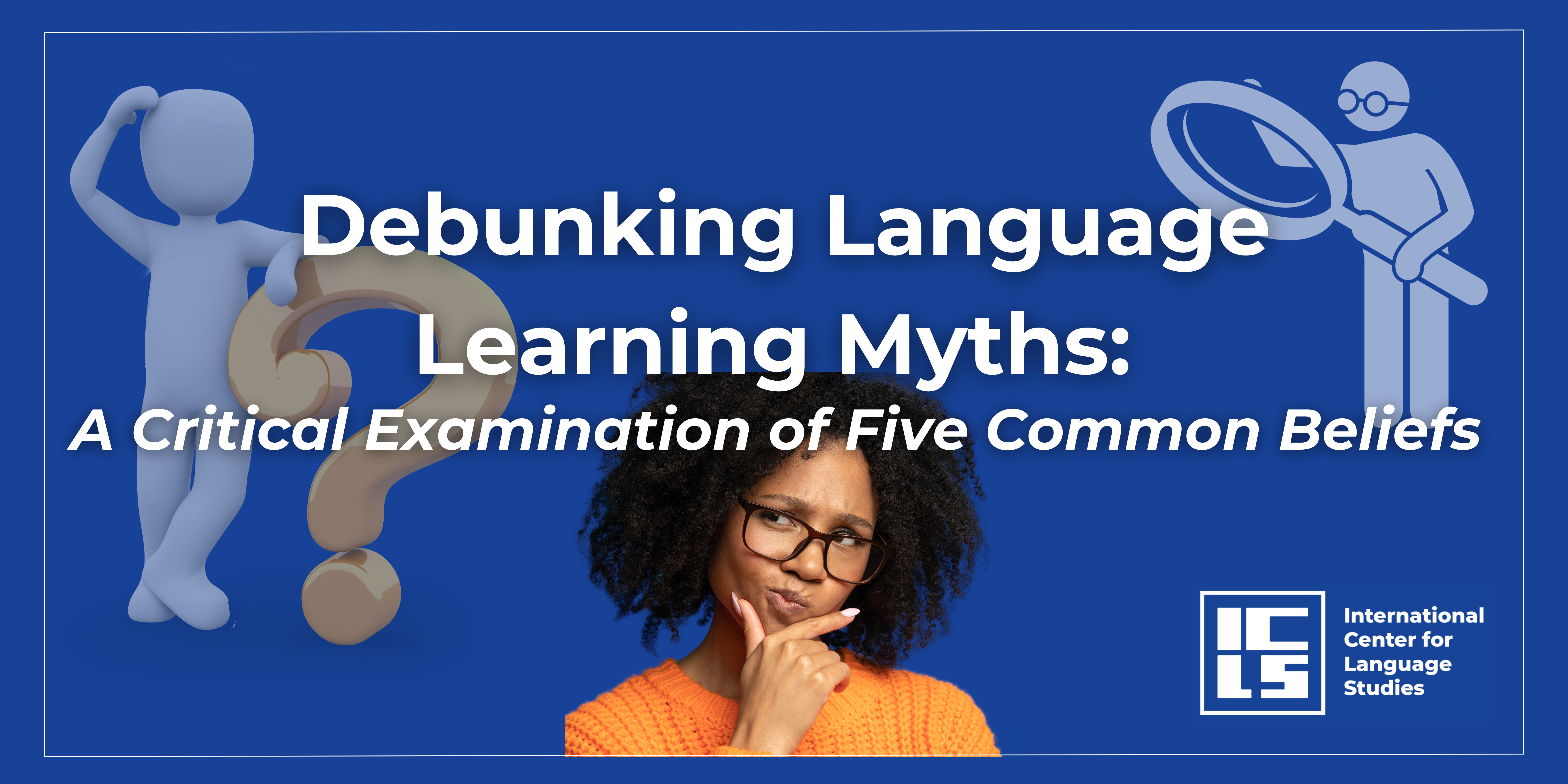Language Myths or Not: A Critical Examination of Five Common Beliefs

By Edwige Simon, Ph.D., Director, Instructional Technology and Online Learning, International Center for Language Studies
In this blog post, ICLS examines five commonly held beliefs about language learning and concludes whether each of them is a language myth or not. Take a moment to quiz yourself before reading this article:
- If You Are Good at Music, You’ll Be Good at Languages — TRUE/FALSE
- Your Speaking Skills Improve After a Few Drinks — TRUE/FALSE
- Adults Can’t Become Fluent — TRUE/FALSE
- Monolingualism is the Norm — TRUE/FALSE
- Some Languages Are Faster Than Others — TRUE/FALSE
If You Are Good at Music, You’ll Be Good at Languages.
Although we cannot fully verify this language myth, there is some truth to it. Several studies have shown that people with musical aptitude do a better job of discriminating between similar sounds in a foreign language, which, in turn, has a positive impact on their pronunciation. In other words, while being good at music does not necessarily mean you will be better at learning languages, it does help with pronunciation, a fundamental element of language learning (Milovanov & Tervaniemi, 2011).
The music and language connection also holds true for tonal languages. In some languages such as Mandarin Chinese, the meaning of a word can change completely based on the tone associated with it. A small-scale study showed that English native speakers who are musicians "identified the tones with 89% accuracy and discriminated them with 87% accuracy, while non-musicians identified them with only 69% accuracy and discriminated them with 71% accuracy" (Alexander et al., 2005).
Note that while being good at music might be an advantage, it is not in any way a requirement to learn a foreign language. There are many other factors that play a significant role in the process, such as motivation, the level of exposure to the language, or instructional hourstime dedicated to learning, to only name a few.
Your Speaking Skills Improve After a Few Drinks.
It’s not a language myth! A 1972 study, Guiora and his colleagues determined that after ingesting a small amount of alcohol, study participants' pronunciation improved. They attributed this outcome to the fact that alcohol helps lower learners’ affective filter. We are not saying that you should ingest a couple of cocktails before attending your Spanish class. Instead, consider ways in which stress might impact your learning experience and try putting yourself at ease while attending class. If the class is in person, wear comfortable clothing, bring a warm drink (like tea). If the class is online, use soft lighting and a comfortable seat. Regardless of whether the class is in person or online, get to know your classmates. Creating a sense of community in the language classroom will make you less nervous at the thought of speaking a foreign language and making mistakes in front of your peers.
Adults Can’t Become Fluent.
This language myth needs a bit more unpacking. In our blog post "Is it too late to learn a language?," we discuss how until fairly recently, linguists believed that past a certain age, learners’ ability to learn a foreign language decreased significantly. But the traditional notion of a "critical period" for language learning has been challenged (Hakuta, Bialystok, and Wiley, 2003). Experts now suggest that the decline in language-learning ability with age may not solely be due to brain development but also to factors like education level and time constraints (Trafton, 2018). Indeed, working adults rarely have large chunks of time to dedicate to learning a foreign language.
What we do know at this point is that it is very difficult for an adult learner to achieve native-like pronunciation in a foreign language. But the good news is that your pronunciation does not need to sound native-like for you to communicate effectively in a foreign language.
Language Myth or Not: Monolingualism is the Norm.
You might feel this way if you grew up in a monolingual environment, but according to Francois Grosjean, “probably more than half of the world population uses two or more languages (or dialects) in everyday life” (Leveen, 2021). Here is an extreme example: There are 839 living languages spoken in Papua New Guinea. Historically, indigenous languages and dialects have been the object of, at times, severe repression, but the tide has changed, and many countries across the world now recognize the great cultural and social benefits that a multicultural society brings to society. Languages should be treasured and preserved. As a matter of fact, in North America, Native American languages are the objects focus of many revival initiatives. The idea of one language, one country is more the exception than the norm!
Some Languages Are Faster Than Others.
Often, when you hear people speak in a foreign language, it feels like they are speaking a million words a minute. That’s in part because those unknown syllables and words bear no meaning to you. However, research shows that some languages are indeed faster than others, and by faster, we mean the number of syllables spoken per minute.
The fastest language in the world is Japanese, with 7.84 syllables per second (SPS). Here are other speech rates to give you an idea of the breadth of language speed:
- Spanish - 7.82 SPS
- French - 7.18 SPS
- Italian - 7.08 SPS
- Portuguese - 6.88 SPS
- German - 6.64 SPS
Of course, there are other factors that may affect speaking speed, including variations between speakers. We all have met people who either speak very fast or very slowly. A speaker’s emotional state may also impact the speed of their speech, with excitement or stress usually translating to a faster speaking rate. A teacher explaining a complex phenomenon might also intentionally speak slower. Regardless of these variations, it remains that your perception that Spanish speakers speak very fast is backed up by research. Now here is where it gets very interesting.
Regardless of the language they speak, a speaker can convey about the same amount of information during one minute of speech. That’s because different languages can pack various amounts of information in syllables and words. So semantic density combined with speech rate even out the disparities between languages in the end.
Now When Each Language Myth Is Debunked...
We hope you enjoyed this blog post. Feel free to share other language myths you’ve heard via email at marketing@icls.edu, and we’ll unpack them for you. If you are ready to (re) start your language learning journey, visit our website and choose a program. ICLS has been offering language training since 1966. Today, we teach 85 languages in formats ranging from one-on-one to group classes, both online and in-person at our beautifully renovated schoolhouse in Washington DC.
References:
- Alexander, J., Wong, P., & Bradlow, A. (2005). Lexical tone perception in musicians and non-musicians. Proceedings of Interspeech, 397-400. https://doi.org/10.21437/Interspeech.2005-271.
- Blackwood, M. (2023, April 25). What Are the Fastest Spoken Languages in the World Today? Word Point.
- Guiora, B., Beit-Hallahmi, R., Brannon, C. Y., Dull, T., & Scovel, T. (1972). The effects of experimentally induced changes in ego states on pronunciation ability in a second language: an exploratory study. Comprehensive Psychiatry, 13, 421–428.
- Hakuta, K., Bialystok, E., & Wiley, E. (2003). A test of the critical-period hypothesis for second-language acquisition. Stanford University and York University, Toronto, Ontario, Canada. Vol. 14, No. 1.
- Kluger, J. (2011, September 08). Slow Down! Why Some Languages Sound So Fast. Time.
- Leveen, S. (2021). America's Bilingual Century: How Americans are giving the gift of bilingualism to themselves, their loved ones, and their country. America Bilingual Press.
- Milovanov, R., & Tervaniemi, M. (2011). The Interplay between Musical and Linguistic Aptitudes: A Review. Frontiers in Psychology, 2, 11022. https://doi.org/10.3389/fpsyg.2011.00321
- Trafton, A. (2018, May 1). Cognitive scientists define critical period for learning language. MIT News Office.


